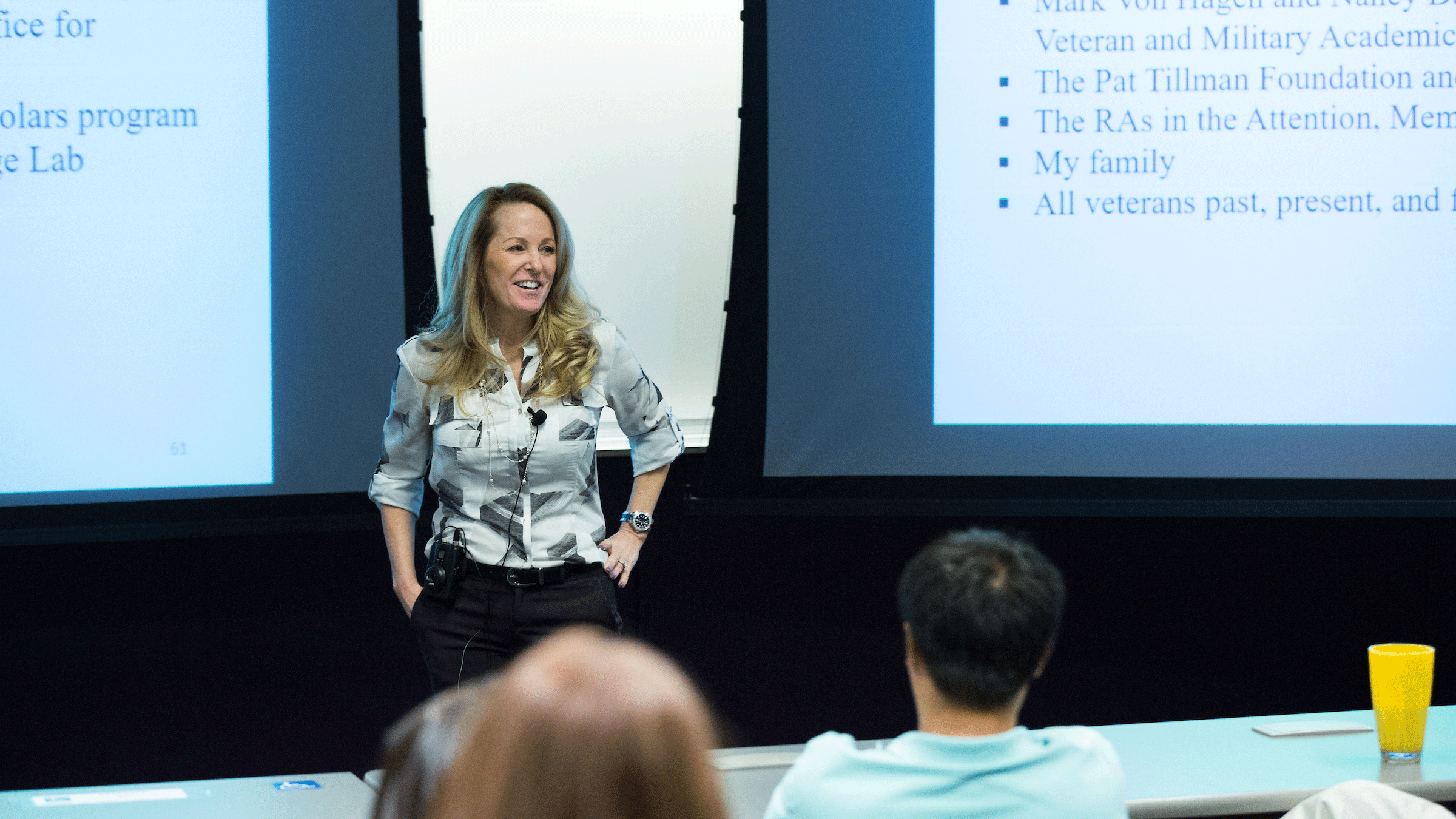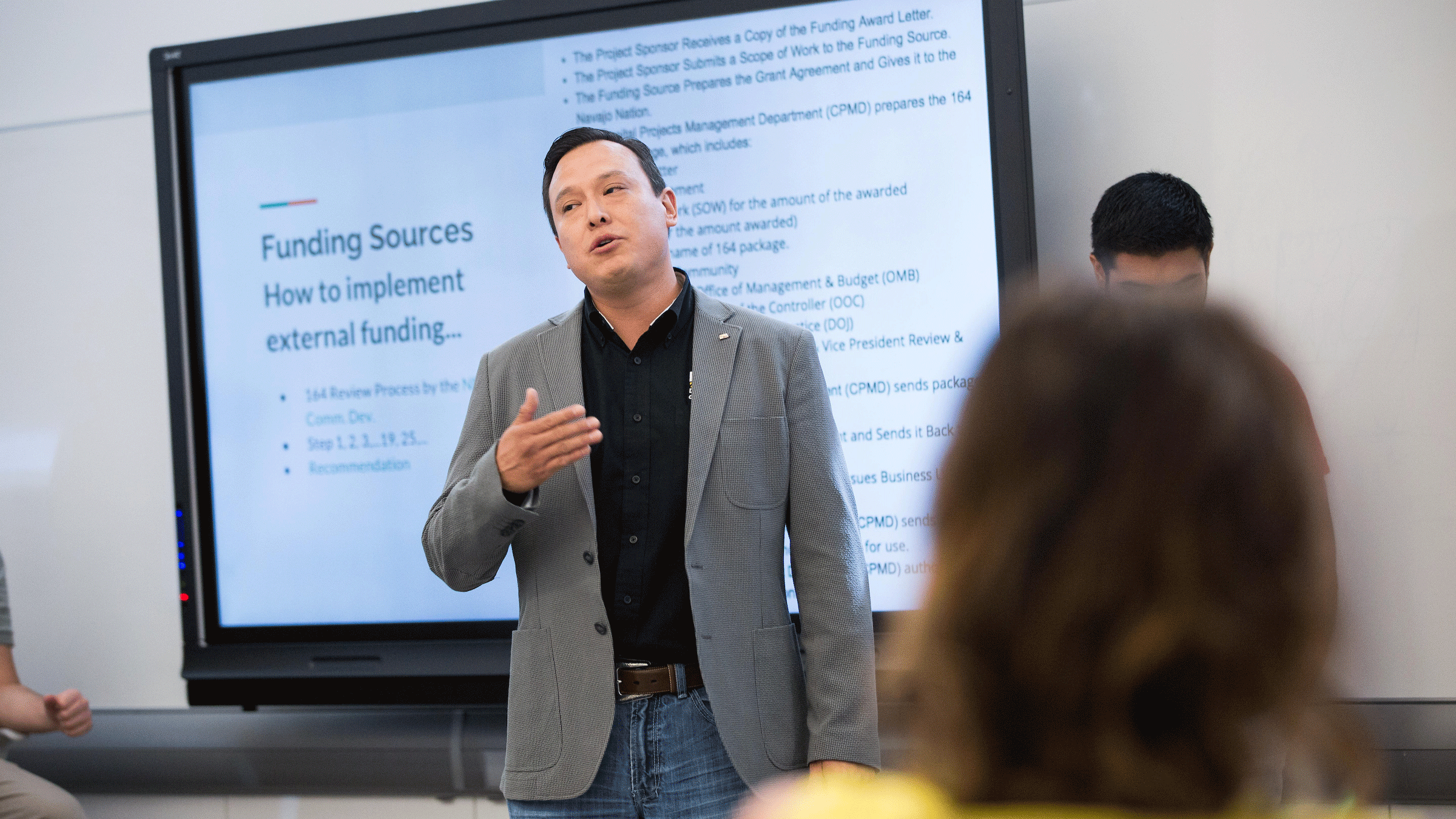A quarter-century ago, Sean McCafferty was at loose ends and didn’t know what to do with his life.
When inspiration didn’t strike, he turned to the Army.
He quickly became a rising star, was sent to West Point and eventually rose to the rank of lieutenant colonel.
“My goal was to stay in the service until it wasn’t fun anymore or until the Army kicked me out,” said McCafferty (pictured above, center). “I figured if that happened, I’d go on and do something else.”
After 25 years in the service, the Army still hasn’t kicked McCafferty out. In fact, they are helping him become a senior leader in the Signal Corps and have sent him to Arizona State University to get his doctorate to become a strategic thinker. He’s one of about 140 veteran doctoral candidates at the university, one of the largest military-affiliated cohorts in the United States.
Video by Deanna Dent/ASU Now
ASU has forged a reputation as one of the nation’s most military-friendly schools thanks to programs aimed at veterans who have left the service as well as active-duty students.
The Pat Tillman Veterans Center is the heart of ASU’s military student efforts, and Matt Schmidt, assistant director for outreach, said that’s by design.
“The staff in the Pat Tillman Veterans Center have committed themselves to creating a culture of empowerment, love, openness and adventure,” Schmidt said of the center, which opened in 2011. “We believe that student veterans and military members exposed to this type of environment are able to better leverage their military backgrounds to succeed at ASU and to continue to lead in the military or in new ways.”
The university’s large veteran population and esprit de corps was a big part of why McCafferty chose ASU for his postdoctorate program, where he’ll study how military technological systems interact with social and other systems at the School for the Future of Innovation in Society.
“There are a lot of things that brought me to ASU, including the interdisciplinary approach and the welcoming atmosphere to veterans,” McCafferty said. “I’ve put all my eggs in the ASU basket.”
Karen Gallagher, Speech and Hearing clinical associate professor and veteran student, defends her dissertation on the Tempe campus on Oct. 27. Photo by Deanna Dent/ASU Now
Gulf War veteran Karen Gallagher said the concept of military-friendly universities didn’t exist when she first pursued her undergraduate degree in 1992 at a Washington college.
“There were no veterans around and for me, not a lot of people to look up to,” said Gallagher, a Tillman Scholar whose research on military members who’ve suffered brain injury and memory loss has brought attention to ASU.
Fast-forward 18 years, to when Gallagher started her doctoral work at ASU. She said the student-veteran landscape has completely changed.
“Everywhere you look at ASU you see veterans,” said Gallagher, a clinical associate professor in the Department of Speech and Hearing Science in the College of Health Solutions. “Now I have plenty of examples of successful role models who were veterans and are now successful in academia. It’s inspiring.”
Doctoral student, Air Force veteran and Native AmericanDenetdale is a Navajo who hails from Shiprock, New Mexico. Marcus Denetdale’s research focus is assessing tribal housing projects.
As a program manager at the Ira A. Fulton Schools of Engineering, he is working with a variety of tribal leaderships to assess natural building materials found on their lands. He hopes to manufacture these materials without leaving a carbon footprint and assist with tribal enterprises.
Air Force veteran and civil, environmental and sustainable engineering doctoral student Marcus Denetdale talks during a presenting for CON 598: Indigenous Project Delivery, on Oct. 17 at College Avenue Commons. Denetdale and his group presented a development project for Tuba City rodeo grounds. Photo by Deanna Dent/ASU Now
Denetdale says his academic journey from undergraduate to PhD took more than 15 years, and he credits the military for instilling academic discipline in him. He also gives props to other vets for keeping him on course.
“Having others in class who have the same life experience has been the biggest help in re-adapting,” said Denetdale, who is also a staff adviser for ASU’s Veterans Club. “We like sharing our experiences and helping each other if we can.”
That's why Gallagher made it a point to invite fellow veterans and past research participants to her dissertation presentation, which packed a room inside Coor Hall on Oct. 27.
“It was important to me to share this day with the veteran community that has supported me along the way,” Gallagher said. “They showed up and participated in my research in order to help other veterans. They had my back.”
“I wouldn’t want to present this work without them. It would be incomplete.”
Top photo: School for the Future of Innovation in Society doctoral student and Army Lt. Col. Sean McCafferty (center) speaks with his classmates as they review a writing assignment Oct. 13 on the Tempe campus. Photo by Deanna Dent/ASU Now
More Arts, humanities and education

Award-winning playwright shares her scriptwriting process with ASU students
Actions speak louder than words. That’s why award-winning playwright Y York is workshopping her latest play, "Becoming Awesome," with actors at Arizona State University this week. “I want…

Exceeding great expectations in downtown Mesa
Anyone visiting downtown Mesa over the past couple of years has a lot to rave about: The bevy of restaurants, unique local shops, entertainment venues and inviting spaces that beg for attention from…

Upcoming exhibition brings experimental art and more to the West Valley campus
Ask Tra Bouscaren how he got into art and his answer is simple.“Art saved my life when I was 19,” he says. “I was in a dark place and art showed me the way out.”Bouscaren is an …




